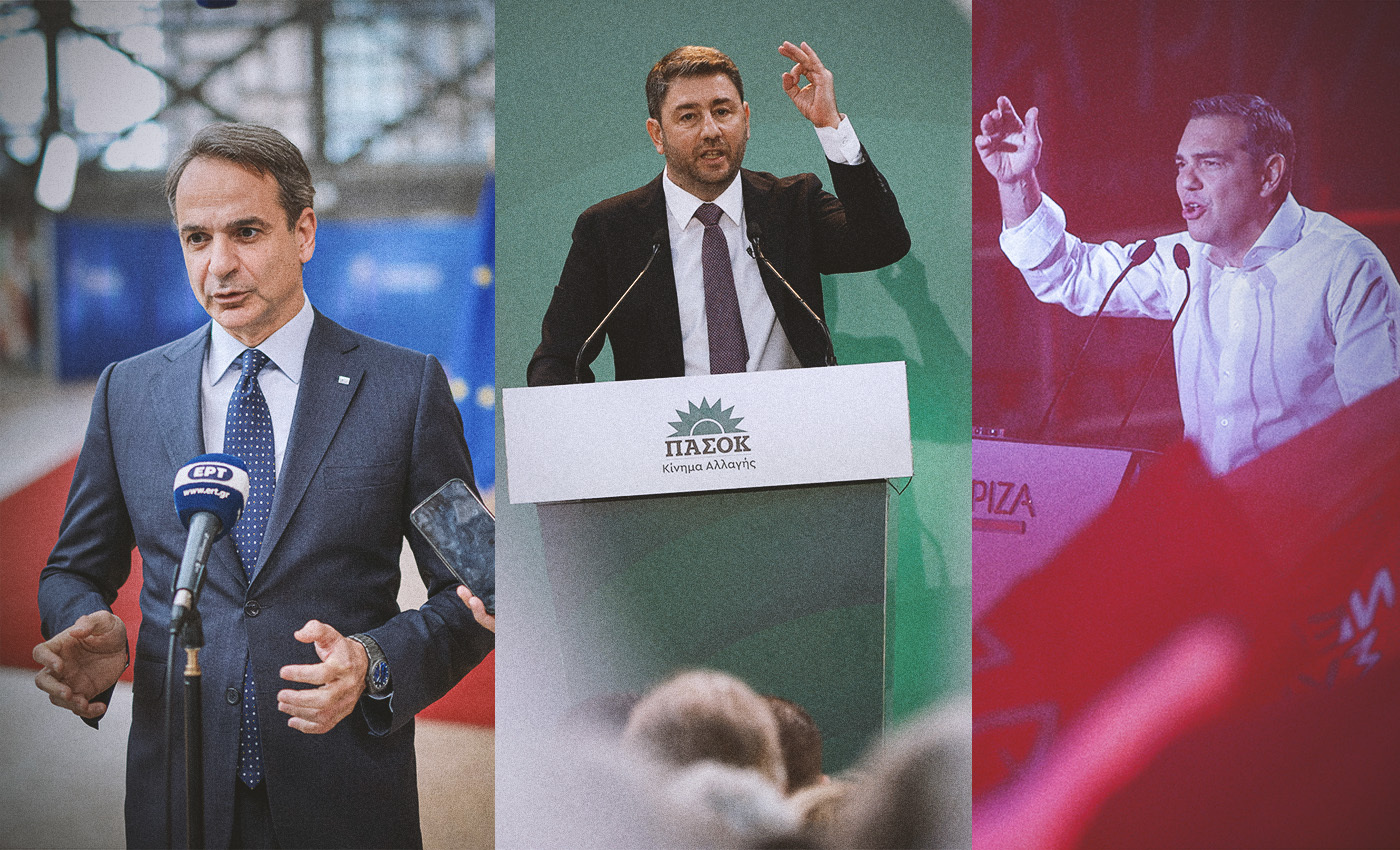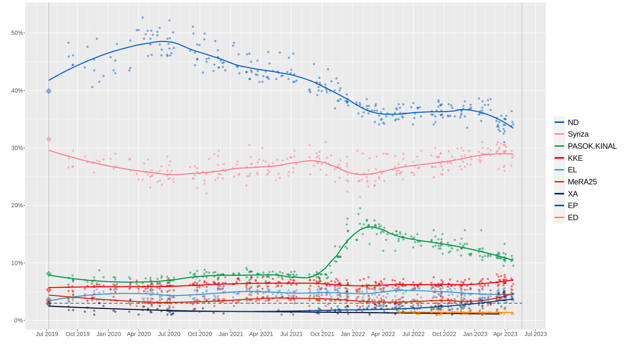By: francesca scott
May 19 2023
The role of misinformation in Greece’s upcoming elections

Greek citizens will head to the polls for the first round of votes on May 21. Due to ongoing corruption and a climate of mistrust toward politicians and the media in Greece, the elections have seen misinformation circulate on various topics, not only from social media users but from those in powerful government positions.
The general elections were delayed several months following widespread protests due to a devastating train crash in February, the deadliest rail accident in Greek history. The collision occurred in Tempi, north Greece, and killed 57 passengers, many of whom were teenagers. The delay has forced a snap election, with the governing New Democracy party vying for a second and final five-year term, as limited by parliament.
The Hellenic Parliament has 300 seats and a majority of 151 by a single party or coalition is necessary to form a government. Parties must receive a minimum of 3 percent of the national vote to enter parliament, which reduces the likelihood of one party achieving a parliamentary majority. A hung parliament is a probable scenario: the three leading parties have all stated their refusal to work together, making a second election in July likely.
Context
For the first time, Greek nationals living abroad will be granted overseas voting rights in a bid to energize the Greek diaspora. Voter registration is automatic, and voting is mandatory, though penalties are unlikely to be enforced. Similarly, Greece’s legal voting age was lowered in 2016, making this the first election that will see 17-year-olds casting ballots, though youngsters are not expected to turn out in high numbers. The 2019 election saw around 58 percent voter turnout, a low figure compared to Italy, Spain, and France, and one that has declined consistently since 2004. This year's elections have a decidedly muted air compared to previous years, with polls predicting high rates of undecided voters.
Following a surge of support for the government's swift approach to the COVID-19 pandemic, several scandals have mired the political landscape of the last five years, which has seen the New Democracy party fall from voter favor. In 2022, a widespread phone-hacking scandal saw politicians and journalists discover attempts to implement spyware on their personal devices.
Prime Minister Mitsotakis survived a no-confidence vote after the poor handling of a winter blizzard that saw around 4,000 drivers trapped in their vehicles for hours in freezing temperatures on one of Greece’s main highways. The Tempi train crash also caused widespread condemnation of the ruling party thanks to understaffing of the rail network and the management of its redevelopment. The Greek company managing the EU-funded signaling contract, known for its close ties to media companies and successive governments, spent years violating its terms, resulting in a 2.4 million euro fine.
In the run-up to the election, Ilias Kasidiaris, incarcerated ex-leader of the neo-Nazi criminal organization Golden Dawn, attempted to stand for election with the newly formed Greeks National Party but was blocked from doing so by the Troika due to Kasidiaris’ conviction, as well as the premise that the party was not able to “serve the free functioning of a democratic constitution.” Attempting to forego the court's actions by replacing Kasidiaris with a retired prosecutor, the Troika responded by extending the terms of the ban with support from New Democracy and PASOK.

Chart reflecting polling data of Greece’s nine qualifying political parties
Source: Europeelects.eu/Greece.
The main players
Greece uses proportional representation to encourage coalition governments. Prime Minister Kyriakos Mitsotakis, who leads the center-right New Democracy party, will face his main competition in Alexis Tsipras of SYRIZA (the syllabic abbreviation of The Coalition of the Radical Left – Progressive Alliance). Center-left PASOK (Panhellenic Socialist Movement) follows in third place, led by Nikos Androulakis.
Mitsotakis is “the son of a former prime minister. His older sister was the Foreign Minister of Greece and his cousin is the New Democracy mayor of Athens.” Looking to secure a second term, he is keen to grow the economy, cut public debt, and decrease inflation. He’s also promised to increase the minimum wage, reduce unemployment, and double renewable energy usage from 40 percent to 80 percent by 2030. His harsh stance on immigration has forced pushbacks of boats in Greek waters and has drawn outrage from human rights organizations.
Former Prime Minister Alexis Tsipras, synonymous with Greece’s disastrous 2015 referendum that saw him renege on the public vote to leave the European Union and accept a far heavier debt burden, has visions of a more liberal Greece. Resonating with new young voters, SYRIZA has promised to increase the minimum wage and pensions, reduce working hours from 40 to 35 hours per week, raise tax to 15 percent on dividends of over 50,000 euros, and protect the homes of defaulted borrowers. He wants to regulate the Airbnb market, which has exploded since 2014, driving up rental prices, and has vowed to push through marriage for same-sex couples, which would make Greece the first Orthodox country to do so.
The death of longstanding leader Fofi Genimata saw Nikos Androulakis take the helm of PASOK, though the party has failed to regain its shine from its 2021 election popularity. Marred by a corruption scandal involving party member and member of the European Parliament, Eva Kaili, the once largest left-wing party in Greece, now holds the balance of power as the winning party will need its support to form a government.
Media, mistrust, and misinformation
Greece scores 52 on the Corruption Perception Index, which tracks “perceived levels of public sector corruption from zero (highly corrupt) to 100 (very clean).” Greek trust in the media is at an all-time low, with only “only 27% of survey respondents said they trusted the media most of the time, which tied for the second-lowest score among the 24 European countries studied.” This has encouraged a wave of fact-checking organizations and the introduction of a 2021 law that criminalizes fake news, threatening journalists with up to five years in prison, a step that further calls into question the country's press freedom.
Former member of Ellinika Hoaxes, an IFCN-accredited Greek fact-checking organization, and founder of Greece Fact Check, Thanos Sitistas, talked to Logically Facts about the country's relationship with misinformation. “Mis- and disinformation is a huge problem in Greece, and in times of political crisis, fake news thrives. Need I remind you what was happening during the economic crisis? From absurd conspiracy theories to fake claims about Russia bailing out Greece from the grip of her creditors, back in 2015, people were willing to believe in every piece of mis/disinformation that would give them some comfort,” he said.
Sitistas notes that misinformation targeting politicians and parties has been circulating since April 2023, ahead of the election, but in lesser quantities than in previous years. He puts this down to the ongoing war in Ukraine, the aftermath of the COVID-19 pandemic, and the recent tragedy at Tempi.
Referencing Europe’s turn toward right-wing politics, Sitistas comments that “Greeks are extremely susceptible to populism, and that fact has led to dangerous realities, such as electing a neo-Nazi party in the Greek and European Parliament. Golden Dawn promised to “clean-up” Greece and restore her to its previous glory, by promising things that were impossible to implement.” These fringe parties and politicians seed misinformation, he says, so we see “Kyriakos Velopoulos, president of (ultra-conservative) Greek Solution party try to gain traction among voters by making absurd claims. For instance, he claimed that the victims in the recent train tragedy at Tempi were double the official number, which was false. Just to note, he is an elected MP that will probably get re-elected, and he promotes conspiracy theories all the time.”
Immigration rhetoric
Tensions between Greece and Turkey are an ongoing cause of concern for many Greeks, as the latter has laid claim to Greek territory, and the ongoing refugee crisis continues unabated. Against a backdrop of far-right politics, ongoing tensions with Turkey about Aegean territories, and disputes over the refugee crisis, anti-immigration misinformation narratives have spread online.
A video depicting a group of people in a migrant camp tending to distraught children was recently disseminated alongside claims that the children were being forcibly shaken to make them cry to garner sympathy for the camera. In reality, the video shows a scene of panic after Greek authorities tear-gassed the camp as adults try to help children in pain. Misinformation denying the authenticity of refugees' and migrants' rights in Greece was recently disseminated by the Greek Minister of Migration and Asylum, Notis Mitarachi, further dehumanizing those seeking safety.
Fact-checking flourishes
On sketching out the kind of misinformation to be found in Greece, Sititas says, “When it comes to mainstream parties and their affiliated media, they usually don't share straightforward fake news, but they often distort the reality by presenting facts with missing context.” In the aftermath of the Tempi train crash, footage of an interview with Mitsotakis circulated online that missed crucial context. The edited video – which Ellinika Hoaxes found to be misleading – shows Mitsotakis stating that relatives of the victims pursuing a lawsuit are exploiting the situation for their own gain. In reality, the video omitted crucial parts of Mitsotakis’ full answer, as well as questions posed by the interviewer. Another video, in which Mitsotakis supposedly denied an increase in temporary workers during his party's term, was found to be false. He goes on to accuse the interviewer of using falsifying data and spreading fake news, further muddying the waters for those watching.
The climate of mistrust in government and media has laid fertile ground for fact-checking organizations to flourish. "So far, traditional news outlets have not invested in fact-checking efforts with any consistency. Still, a variety of new outlets have flowered here, including partnerships between journalists, academics, and nongovernmental organizations," Poynter reports. This bloom of fact-checking organizations is essential for tackling narratives that not only sow confusion among voters, but also skew the entire political landscape in Greece.
This article was amended on 23 May 2023, to omit the term "the Troika," inaccurately used to describe the Hellenic Parliament.


